Picture this: after a long day, you finally get the kids to bed and finish chores. But then, like a moth to the flame, you’re back in the kitchen. Sound familiar? If so, you’re not alone.
Eating when bored is so common for busy parents…but most parents would like to be able to stop.
While not necessarily a “bad” thing, boredom eating can become an issue when it is the only tool in your coping toolbox.
Hello and welcome! I’m Marissa, a Family Nutrition Expert & Corporate Wellness Dietitian, and mom to two girls. I take joy in helping my clients get unstuck in the diet cycle so that they can adopt healthier eating habits – and become role models who have a positive relationship with food.
In this article, I will walk you through why we turn to food for comfort, help you identify your unique triggers, and provide practical strategies to crush this habit for good. By the end, you’ll feel confident exploring healthier coping mechanisms beyond food.
Listen to this article:
Audio of this article, How to Stop Eating When Bored (above).
What is boredom eating?
This may surprise you, but boredom eating is actually a form of emotional or mindless eating (1). And it may happen, even if you wouldn’t consider yourself as feeling bored.
Boredom eating typically happens because something has triggered you, in response to something external rather than a genuine internal hunger cue.
As in our previous example, when your kiddos are all tucked into bed and you have your coveted “me time,” this external trigger might make it tempting to want to have something exclusively for yourself.
Like that hidden ice cream tucked away in the freezer (yum!).
And while it is certainly okay to eat out of boredom, sometimes it can feel like there is some shame around it. Like you’re trying to keep it a secret that you just ate five of your kids’ oreo cookies or got to the bottom of a pint of ice cream.
Or just that you feel like you can’t stop eating.
There is some great information later in the article about the fact that not all boredom eating is “bad.”
And even if you’re not hungry, that ice cream serves as a source of refuge. It may even take on additional dimensions, such as:
- Coping with stress
- Eating as a means of distraction
- Eating out of habit
- Eating with little memory of it
- Disconnecting entirely to escape your reality
Whatever the reason is, you might notice that this habit has become difficult to break and you notice the shame creeping in.
We’ll unpack later in the article how to make boredom eating a part of your coping toolkit without shame.
But in the meantime, while boredom eating itself is not seen as a form of disordered eating, it is still part of “the eating behavior spectrum” pictured below if it becomes the only coping tool, which means we must dissect what’s happening here to create a more mindful and healthy relationship with food.
Why is it so tempting to turn to food for comfort?
Well, food is pleasurable – as it should be!
Whenever we consume food, we activate something in our brain called “the reward center,” which releases feel-good neurotransmitters, such as dopamine. Dopamine is associated with pleasure, creating a positive association with eating (2).
There are many reasons why food provides a sense of pleasure beyond just taste (3), which goes beyond the scope of this article.
The bottom line: we turn to food because it literally makes us feel good.
So when we are looking for solutions to stop this behavior, we have to keep that in mind.
Is boredom eating harmful?
Short answer – no.
When approached with intention and mindfulness, boredom or emotional eating can become a valuable coping tool.
When you acknowledge that your emotional connection to food is just one tool among many in your coping toolbox, it shows that you are aware of alternatives when dealing with boredom or stress.
However, if food consistently becomes your default coping mechanism more often than not, or you are not feeling in control of your late-night eating, continue reading to understand the role of environmental triggers, and what you can do about it.
Before you can figure out a good relationship with eating long term, we’ll need to uncover the root causes of why you’re eating at certain times or after certain triggers to begin with.
Let’s explore that, next.
Feeling out of control around food at night and eating when bored is not about you having a lack of willpower.
For many of us, having that snack or treat at night is a habit that feels automatic.
You’re bored, you’re stressed, you’re tired and then, as if on auto pilot, you’re halfway through a pint of ice-cream or well on your way to finishing a crunchy bag of chips.
In this kind of headspace, food is offering comfort to help smother an uncomfortable feeling.
How do you know?
We have to take what I call, the “sacred pause” so that we can explore what is hiding just below the surface.
What’s going on here?!?
Tip #1: Sit in the window of tolerance
Enter, “the sacred pause.”
There is a little magic that happens between the thought of eating and actually doing it.
When I work on this practice with my clients who have spent years dieting, we aim to “expand their window of tolerance” to embrace discomfort (4).
What would it feel like to sit with a hard feeling without numbing it with food?
Over time, they can identify their triggers and listen to their body’s needs.
How do you begin to do this?
First, start with this 5-step approach:
The idea here is to move through what could be “triggering” your choice to eat by taking a pause.
This is “sacred” because within this window, you can step back and think through what you truly need:
- AWARENESS: tune in to your logical thoughts and simultaneously how your emotions are playing a role. Recognize the patterns and triggers that are guiding your decision to eat.
- VISUALIZATION: envision your actions before taking them. This is called, “athletic visualization.” Athletes like Simone Biles and Travis Kelce visualize their success to help bolster confidence.
- MINDFULNESS: practice being present in this uncomfortable space. Mindfulness can help you make conscious decisions, minimizing impulsive actions. It also helps you unpack whatever is coming up at that moment.
- COURAGE: embrace uncertainty. Remember that even the tiniest steps can lead to profound change. It doesn’t always feel good to take the harder road.
- REFLECTION: after the dust settles, reflect. What did you learn? How can you improve your food decision-making process for next time?
Alright, so let’s dive into some practical strategies to help you stop boredom eating now that you can recognize when and why it’s about to happen.
How to Stop Eating When Bored
As you know, eating relieves boredom.
It also provides an easy distraction from all types of psychological discomfort.
For this reason, when you choose to stop eating when bored, you need a different coping mechanism.
Learning to stop eating when bored is a practice that takes time; it isn’t just about willpower, it is about identifying why your emotions are feeling wonky to begin with.
I also want to let you know that as you begin to rely less on eating for comfort, things might feel harder before they get better, especially if eating has been your main coping tool for a long time. Hang in there.
But eventually, this discomfort will subside and along the way, you will find more productive ways to manage boredom and stress.
To get started, you might find the following acronym helpful, as it accurately suggests what we want to do in these moments: PAUSE.
Tip #2: P.A.U.S.E.
P: prompt
Identify an event that prompted your current thoughts and feelings. Maybe something happened today, or maybe it’s been building up. You can say, “I don’t know” – that’s a valid answer.
A: acknowledge
Acknowledge your emotions. I love the expression, “name it to tame it” which is coined by Dr. Dan Siegel, because it is a way to make sense of your feelings (5). Are you feeling angry, irritated, stressed, sad, tired? It’s okay to have negative emotions due to a negative event. Even if you end up eating food to cope, the simple act of acknowledging “the why behind eating” will help you detect patterns in the future.
U: urge
Name the urge you want to do right now. The urge is to “eat my kids’ goldfish or Oreos.” Know it’s okay to have these urges and it is normal for them to pop up in your mind as you navigate a path toward self-compassion and body awareness.
S: solution
Commit to a solution that you will do in place of the urge. As you rewire your brain to try something new, this solution may not feel as exciting as eating, but it is how neuroplasticity works (6)!
E: execute
Follow through with your solution and execute! Do this as soon as possible so that you can avoid the urge and take action toward a healthier response to your external situation.
What are other tools to add to my coping toolbox?
Now that you are going to try using “the sacred pause,” here are some ideas you can add to the “S” in your SOLUTION.
Tip #3: Change of scenery
To enhance your chances of curbing boredom eating, consider making a change to your environment.
Taking a brief moment to yourself, whether it is getting fresh air or spending a minute in the restroom, can disrupt the urge to eat impulsively.
If you have young kids demanding your attention, and stepping away isn’t feasible, explore the next idea.
Tip #4: Try the 5-4-3-2-1 Grounding Technique
When we can get out of our head and into our body senses, we can start feeling more present and empowered.
The 5-4-3-2-1 method is a grounding exercise that you can use to calm down and pivot quickly.
This is how it works. Focus on the following:
- 5 things you can see
- 4 things you can hear
- 3 things you can feel
- 2 things you can smell
- 1 thing you can taste
Let’s take a minute to try this right now! 5-4-3-2-1.
By running through this list and slowing down to be in touch with your senses, you will be able to calm your nerves.
This might help you shift your focus from what’s happening in your environment to what is causing the desire to eat.
Tip #5: Run water over your hands
This idea came about specifically for my busy parent clients.
While taking a shower or bath or lighting candles is certainly very pleasant, it isn’t exactly a practical solution for busy parents who really need a quick way to curb the boredom eating cycle.
My clients have benefited greatly by splashing cold or warm water over their hands and face as a “wake-up” to their senses.
It also allows you to do this even when your kids are in the same room!
Tip #6: Keep your hands busy
Not near water? Use your hands for something else other than dealing with food.
Maybe use an adult coloring book – or one that your kids already have!
Try doing some lanyard (remember friendship bracelets?) or petting one of your kids’ stuffed animals (or an actual pet).
You can also try writing in a journal or on any piece of paper to share your feelings.
The goal is to do something with your hands that doesn’t involve food.
Tip #7: Take a walk or exercise
No one ever said, “I regretted moving my body just now.”
Even if you need to bring your kids outside, physical activity will activate the reward center, as mentioned earlier, triggering the release of those feel-good neurotransmitters.
You can also consider having a spontaneous dance party or jump on your kiddo’s trampoline.
Tip #8: Meal plan your family’s food needs
At times, boredom or stress eating can result from a lack of planned, satisfying meals at home.
Ensuring your fridge is stocked with go-to snacks and meals, along with the confidence that you’re nourishing yourself and your family, can prevent the endless cycle of “nothing looks good, so I’ll just keep eating until I’m stuffed.”
If this feels like your situation, I encourage you to check out this free dinner planner that my clients are loving; it can seriously help you feel organized and well-fed for the entire week!
Tip #9: Hydrate
Are you drinking enough fluids?
Hydration has beneficial effects on mood, which can be associated with mindful eating (7).
Additionally, hydrating improves digestion and helps with bowel regularity, which is all connected to feelings of hunger and satiety.
So grab your fave Stanley and keep it with you throughout the day!
Tip #10: Ask yourself if you really ate enough?
What was “enough” to you? How did you determine this?
- Did you eat enough protein at breakfast?
- Did you eat lunch or skip it?
- Did you avoid having carbs with a meal?
You might actually be hungry or need more food.
Your personal hunger or fullness cues offer better insight than the calories on a box.
Try to figure out what was “missing” at a any given meal or snack to help you determine if you truly ate “enough.”
Tip #11: Follow an “All Foods Fit” approach
One big reason why you might snack when you are feeling bored is that you feel restricted from eating certain “forbidden” foods.
If you find yourself feeling guilty about munching on less healthy options, it might be a hint that embracing an “an all foods fit approach” could be a great idea.
For some parents, eating these “forbidden” foods may bring a bit of excitement or a feeling of freedom.
By integrating these foods into your daily routine, you give yourself the green light to enjoy them mindfully, rather than just scarfing them down out of boredom. Or because you don’t know the next time you will get to eat them.
Tip #12: Use Intuitive Eating Principle Seven
Taken straight out of the 10 Principles of Intuitive Eating, try the seventh principle, which is to “cope with your emotions with kindness.”
When you restrict food, you put yourself into a situation where the opposite can occur – eating out of boredom, stress, or another emotion.
While food is helpful to numb or avoid an emotion, it never solves the actual problem. Instead, we can take the wise words of Evelyn Tribole and Elyse Resch to find, “…gentle ways to comfort, nurture, distract, and address your issues” (8).
Download all twelve of these tips here for easy reference:
What improvements can I expect when I stop eating out of boredom?
Ultimately, you may notice improvements in both your mental and physical health.
You will be able to sort through what you’re feeling (and what to do about it).
For example, if tiredness is driving your desire to eat, recognizing this allows you to address the root issue by finding better ways to get more sleep.
Additionally, you’ll establish new habits.
Instead of turning to food in response to emotions every single time, you’ll become mindful of environmental cues that influence your food choices. This shift not only benefits you but also sets a positive example for your family.
Being a role model for mindful eating can contribute to fostering a healthy relationship with food for the whole family.
By avoiding excess food consumption on the daily, you will foster a healthier relationship with food, contributing to your overall well-being.
Final thoughts
Whether eating out of boredom, procrastination, or stress, you now know this behavior is a form of mindless and emotional eating.
While boredom eating isn’t necessarily harmful, over time, this behavior might create feelings of guilt, and shame and can spiral into additional unhealthy eating patterns.
If you are feeling overwhelmed and want help with a friendly non-diet approach, download my FREE guide to break the cycle of mindless and boredom eating.
You will learn the exact steps I use with my clients to help them feel revved about their health and nutrition without dieting.


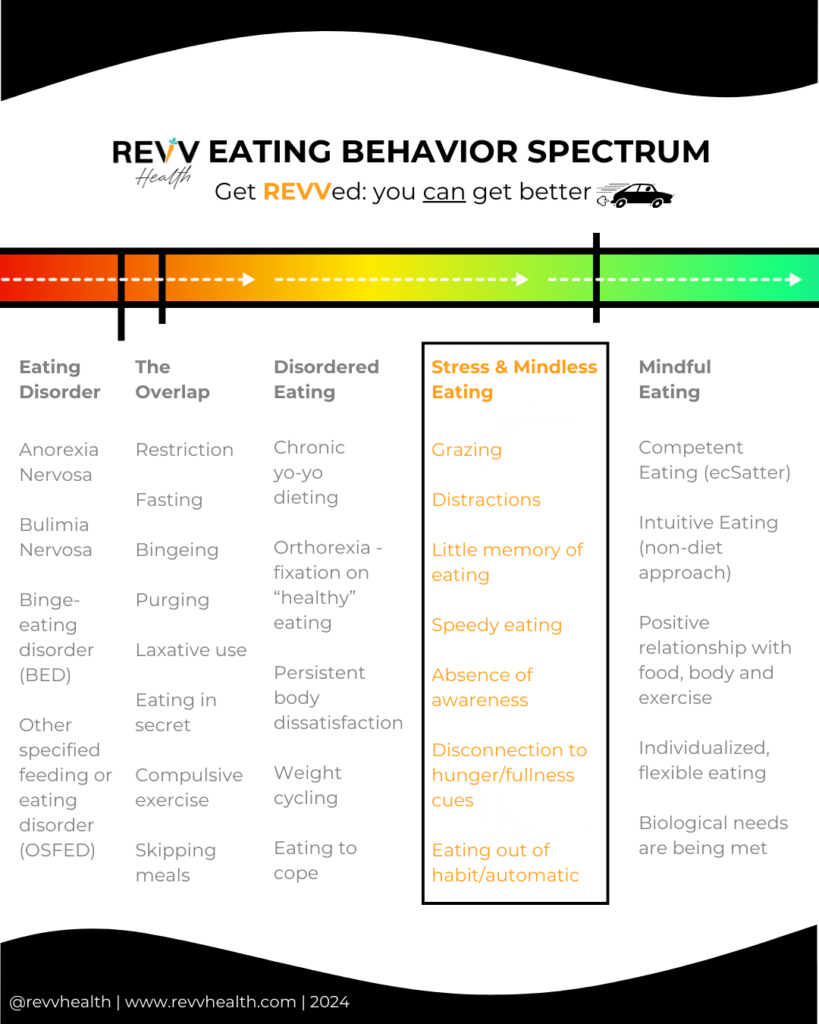


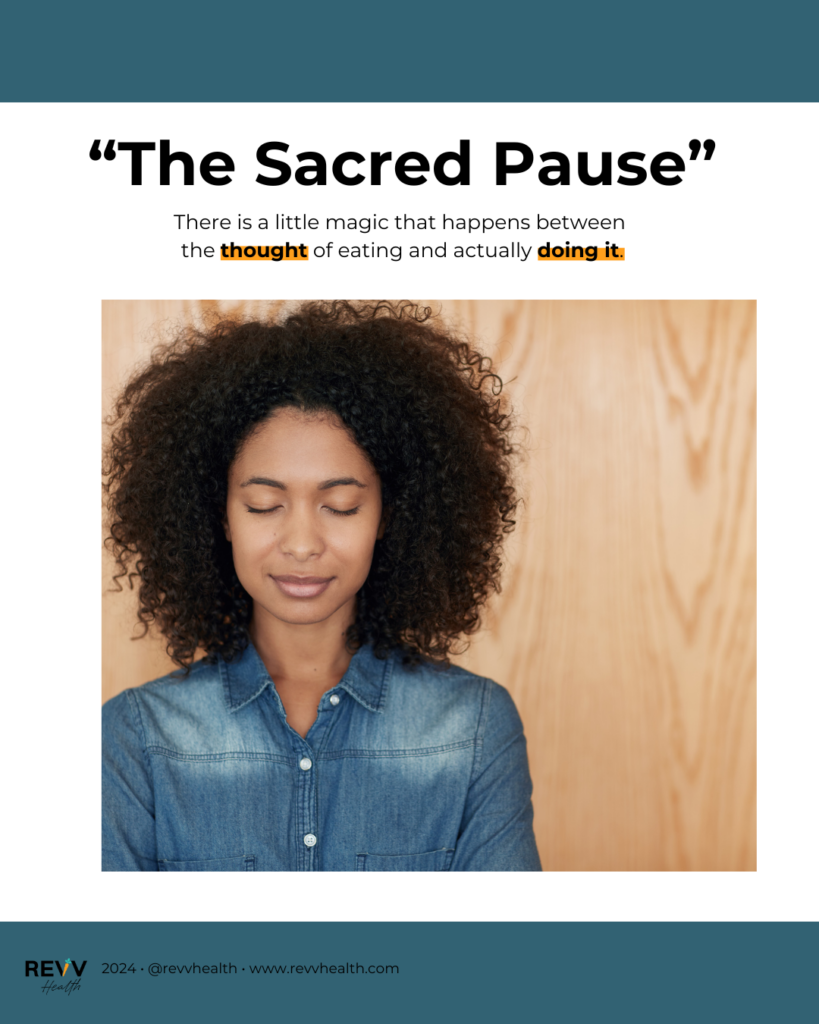
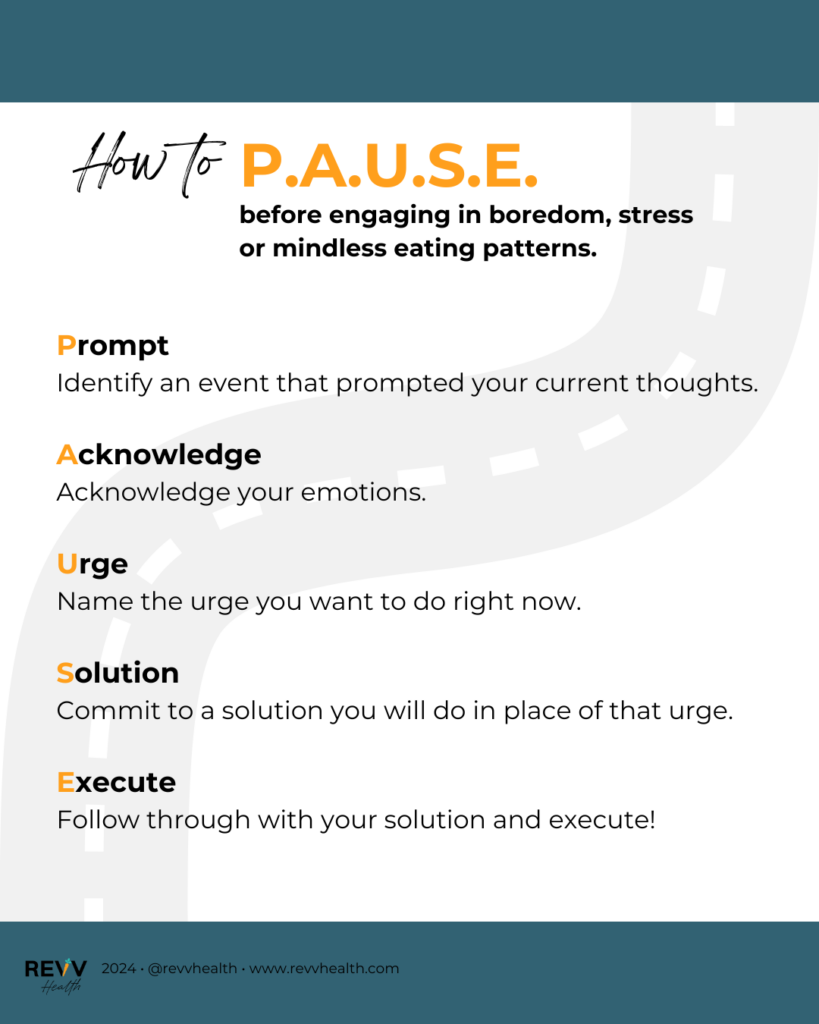
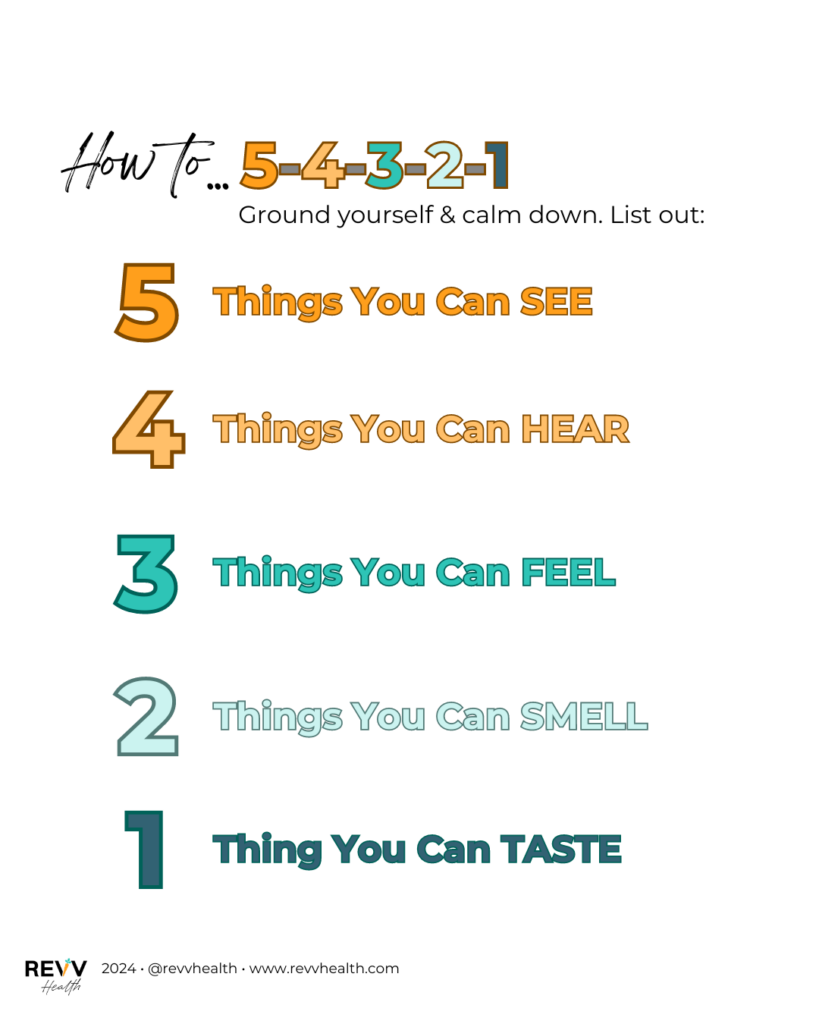




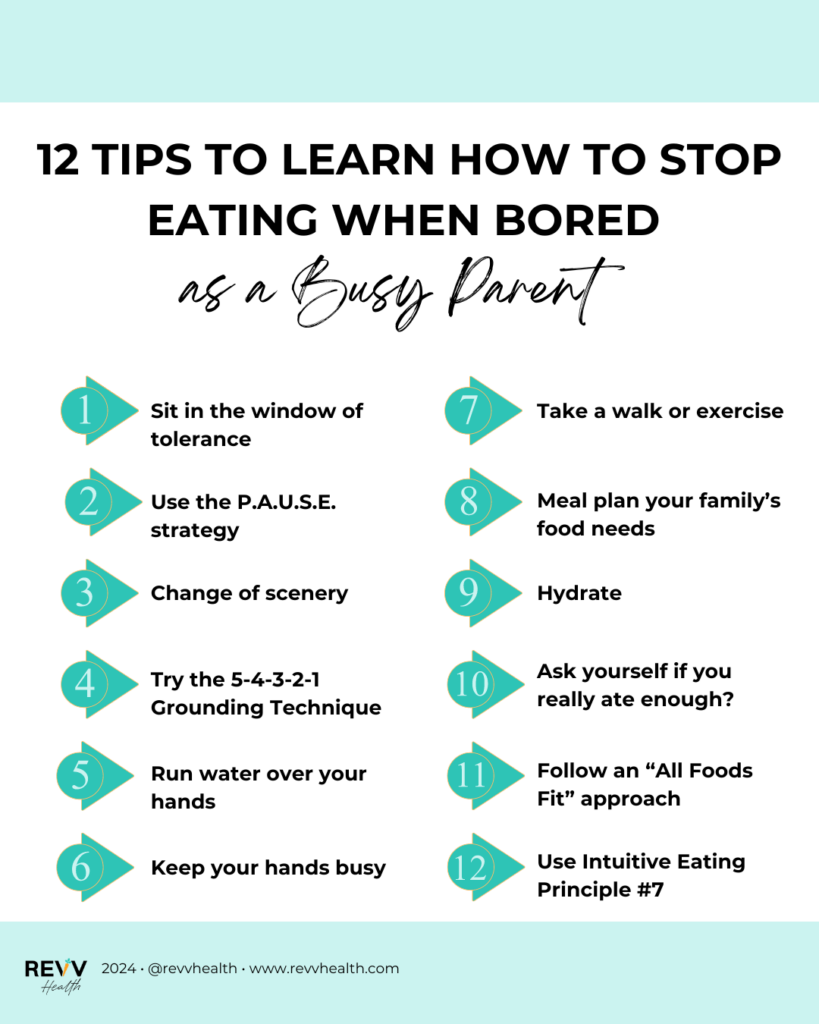
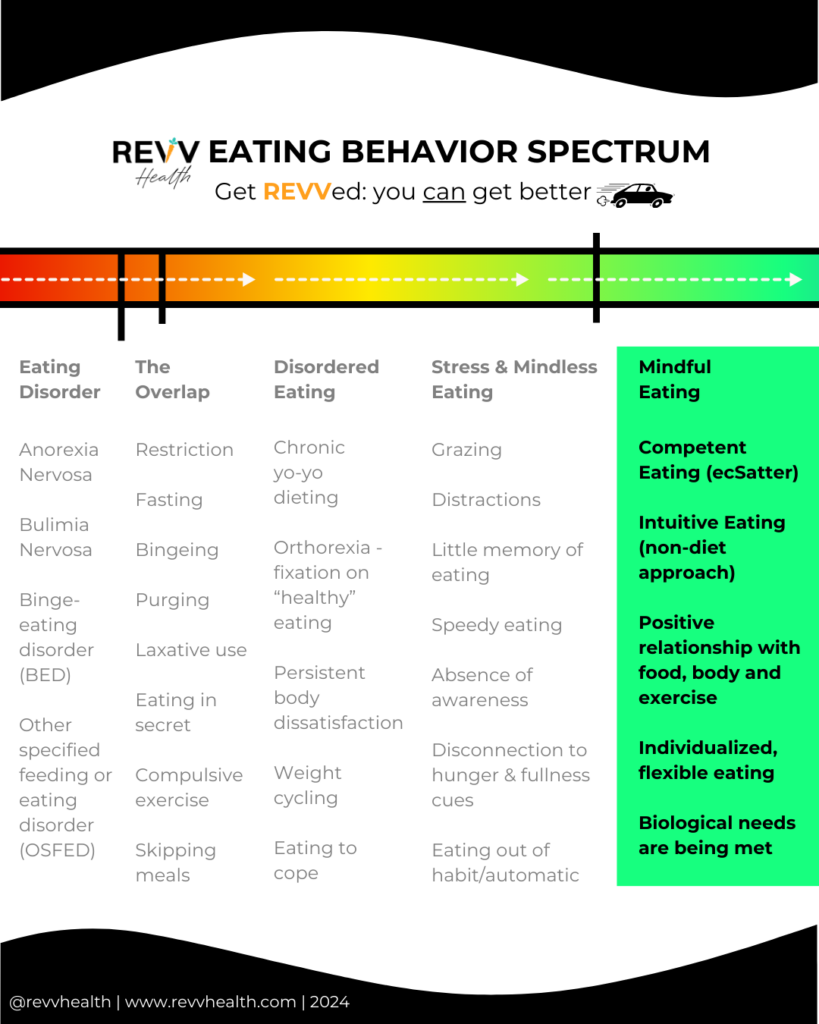

Hi my loved one! I wish to say that this post is amazing, nice written and include approximately all vital infos. I’d like to peer more posts like this.
Your posts are so well-written and engaging You have a way with words that keeps me coming back for more
Your posts always provide me with a new perspective and encourage me to look at things differently Thank you for broadening my horizons
Hey there! I wanted to take a moment to let you know how much I enjoyed this blog post. Your insights were incredibly helpful and thought-provoking. It’s clear that you put a lot of effort into your writing. Thank you for sharing your expertise with us. Looking forward to your next post!
That is very kind of you to say, thanks for your comment!